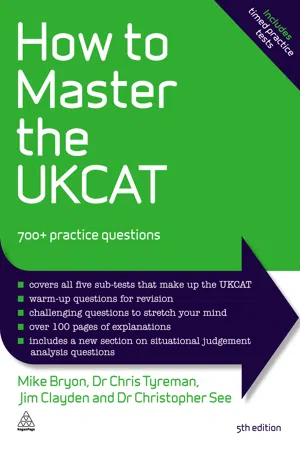Chapter 1
Verbal reasoning
For a sizable minority of candidates, tests of verbal reasoning are their worst nightmare. Often these individuals are accomplished in, for example, science or mathematics but they can do little better than realize the norm rating in these common verbal tests. If you are the sort of candidate who will shine in the quantitative reasoning and abstract reasoning tests but fear that you will struggle with the verbal reasoning paper of the UKCAT, now is the time to get down to some serious score-improving practice.
The verbal reasoning sub-test comprises a series of passages followed by questions. Each question is a statement, and your task is to decide whether, according to the passage, the statement is true or false or whether you cannot tell if it is true or false. Typically these questions require you to comprehend meaning and significance, assess logical strength, identify valid inference, distinguish between a main idea and a subordinate one, recognize the writer’s intention and identify a valid summary, interpretation or conclusion.
The subjects of the passages are drawn from a great many fields, such as current affairs, business, science, the environment, economics, history, meteorology, health and education. In fact, expect almost any subject. If you know something of the area, take care not to use your own knowledge. Be especially careful if you know a great deal about the subject or if you believe the passage to be factually incorrect or controversial. You are expected to answer the questions using only the information the passage contains. It is not a test of your general knowledge, your knowledge of the latest findings in the discipline or your political views. So feel completely at ease about answering true to a statement that is true in the very limited context of the passage even if you know that it is false given what you have learnt at university or read in a newspaper that morning.
When publishers of real tests develop an advanced verbal reasoning test they rely on fine distinctions between the suggested answers in order to distinguish between the scores of the large numbers of candidates. These distinctions are much finer than those we draw on a day-to-day basis. As a result, it is common for candidates to feel irritation and complain that these tests are to a large extent arbitrary. And in a way they are, for after all this is not how we use language at work or anywhere else but in the surreal world of tests. This is something you just have to accept and get used to, and with practice you will get to recognize the subtle distinctions being drawn.
Take care not to err too much towards the ‘can’t tell’ suggested answer by making the mistake of applying too strict or too inflexible a test of proof. Be sure to read the questions as carefully as you read the passage and learn to pick up the many clues provided in the wording of it. For example, if the passage refers to ‘a valid argument, inference or premise’ or asks ‘Is it ne...
